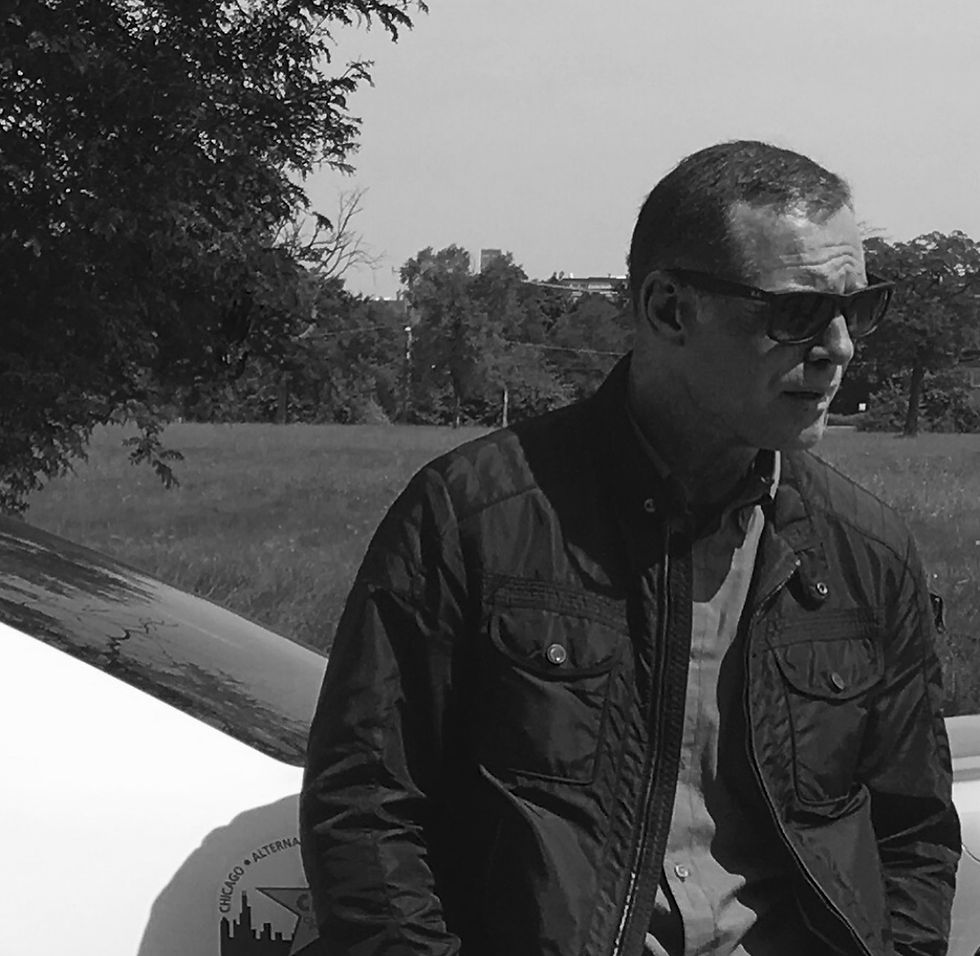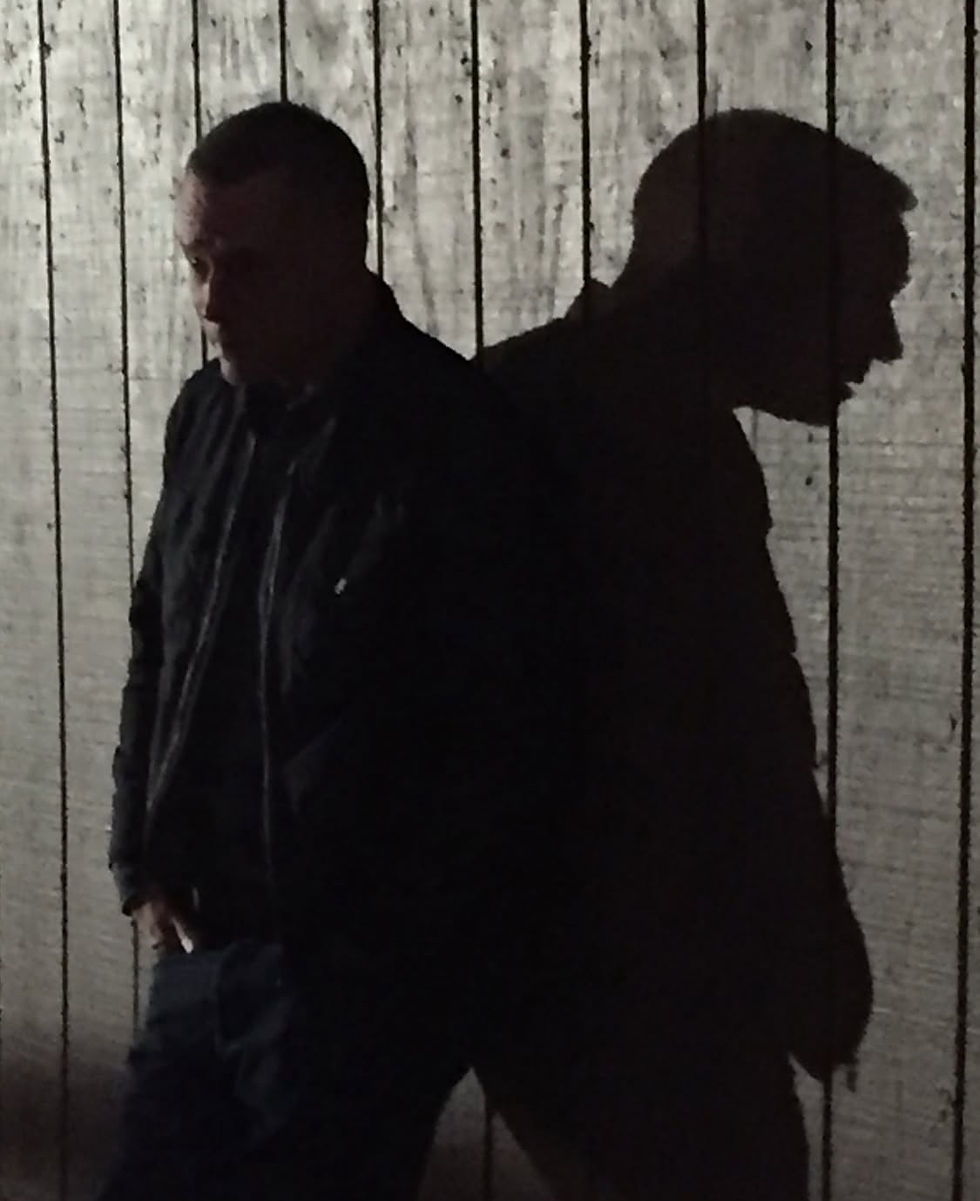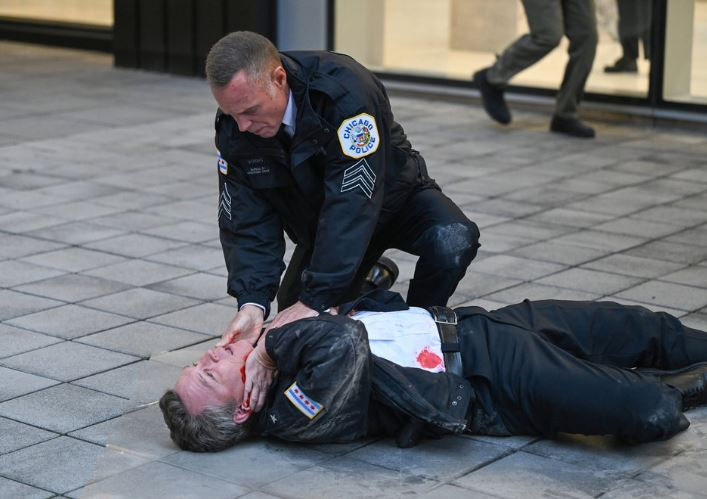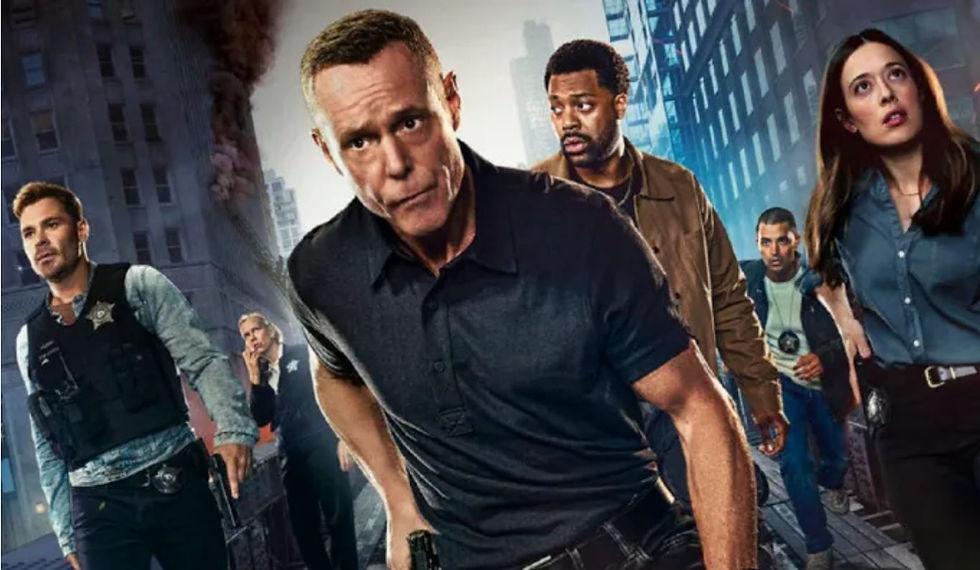The Evolution of Sgt. Hank Voight: Unraveling the Legend of Chicago PD’s Relentless Guardian
- Jo Marie

- Jul 25
- 12 min read
Updated: Jul 27
A Deep Dive into the Psyche, Legacy, and Future of Hank Voight

Introduction
Few characters in the landscape of modern television have gripped audiences and provoked debate as powerfully as Sergeant Hank Voight of “Chicago PD.” Portrayed with gravelly conviction and raw depth by Jason Beghe, Voight straddles the line between hero and antihero—Chicago’s shadowy defender, propelled by his own fierce sense of justice. Over more than a decade, his journey has zigzagged through corridors of moral ambiguity, fierce loyalty, and personal tragedy. But to truly understand Hank Voight, one must begin at his origins, track his evolution across twelve turbulent seasons, and peer into the soul of a man forever at war with his city, his enemies, and himself.

Genesis: Voight’s First Fire on “Chicago Fire”
Voight’s story ignited not with “Chicago PD,” but in the heat of “Chicago Fire.” Introduced as a sergeant with a reputation for bending—if not outright breaking—the rules, Voight’s arrival was shrouded in controversy. His debut saw him as an antagonist, a corrupt cop desperate to shield his son from a DUI, and willing to threaten anyone—including firehouse protagonist Matthew Casey. Yet, glimpses of deeper motivation flickered beneath his tough exterior even then.
Jason Beghe once reflected, “Voight is a guy who will do anything to protect his family. But his definition of ‘family’ is… complicated.” This complexity would soon become the foundation of Voight’s transformation.
From Villain to Antihero: The Pivot Point
What rendered Voight unforgettable was his ambiguity. He was never a cartoonish criminal, but a man who believed the ends justified the means. Within a few episodes, Voight’s layers began to emerge. He was arrested, imprisoned, but ultimately released—his reputation battered yet unbroken. This set the stage for his essential paradox: Voight would always be both a savior and a sinner.
Voight’s unforgettable presence stemmed from the intricate ambiguity at the core of his character. He was never simply a crooked cop nor a one-note villain—his actions were driven by a complex moral compass where right and wrong bled into each other. Voight was a man who lived in the liminal spaces of justice, believing fiercely that the ends justified the means, even when those means veered into dangerous territory.
Almost immediately after his introduction, the narrative began peeling back layers to reveal the man beneath the badge. Far from being a static antagonist, Voight found himself ensnared in consequences of his choices: arrested and imprisoned, his authority and loyalty tested at every turn. Yet, despite these setbacks, his spirit remained unbroken, and his release signaled not redemption, but a doubling down on his core philosophy. His reputation among colleagues, criminals, and superiors became the stuff of legend—part cautionary tale, part reluctant admiration.
This duality—the savior and the sinner, the protector and the punisher—became Voight’s defining feature. He operated in shadows where the law grew thin, making impossible decisions in the name of a justice only he understood. As his influence grew, so did the mythos surrounding him: a leader both revered and feared, a renegade who would sacrifice everything to protect those he considered family, yet who was haunted by the very violence and loss he fought to contain.
It was this essential paradox—Voight as both the city’s shield and its most unpredictable weapon—that set the stage for his journey through years of blood, loyalty, and loss.
The Evolution of Voight: 12 Years of Blood, Loyalty, and Loss
From his first appearance in 2012, Voight’s trajectory has undergone seismic shifts. Each season of “Chicago PD” peeled away a new layer, exposing a man at once unbreakable and deeply scarred.
Season 1: Walking the Line
In the early days of “Chicago PD,” Voight assembled his Intelligence Unit—a team as fiercely loyal as he was. He ruled them with an iron fist, demanding results and loyalty above all else. His methods were brutal; he was not above roughing up suspects, planting evidence, or threatening witnesses. To some, he was a necessary evil, the only force capable of holding Chicago’s underworld at bay. To others, he was a dangerous relic, a cop out of time.
It was in these moments that Voight’s psychological makeup became clear. He was defined by a singular trauma: the murder of his son, Justin. This wound festered, fueling his rage, his need for control, and his willingness to do whatever it took to keep his surrogate family safe.
Beghe explained in an interview, “Voight has been through so much loss. Losing a child… that changes you. It colors every decision you make. You stop seeing the world as black and white—it’s all just gray.”

Seasons 2-4: The Cost of Justice
As the seasons progressed, Voight’s tactics began to attract scrutiny. Internal Affairs investigated his unit more than once. He clashed with superiors, skirted suspension, and faced the near-constant threat of exposure. Yet what kept audiences on his side was his unwavering devotion to justice—however he defined it.
During this period, Voight’s relationships deepened. His dynamic with Detective Erin Lindsay—whom he regarded as a daughter, offered a rare glimpse at his capacity for tenderness. Their bond was forged in shared trauma, mutual respect, and an unspoken understanding that sometimes, you have to fight darkness with darkness.
But the more Voight gave of himself, the more he lost. Friends died, team members betrayed him, and the city’s violence never abated. Each loss etched itself into Voight’s soul, hardening him, isolating him.

Seasons 5-8: Crossing the Rubicon
By the middle years, Voight had become both legend and cautionary tale within the Chicago Police Department. His reputation preceded him—some feared him, others revered him. The city’s criminal element knew that crossing Voight was a dangerous game.
But the lines between right and wrong grew ever blurrier. Voight’s retaliatory killing of his son’s murderer—a cold-blooded execution—was a turning point. For the first time, his actions had real, irreversible consequences. He became haunted by what he’d done, even as he justified it to himself and his team.
“I think Voight believes in justice,” Beghe said, “but his justice is personal. He doesn’t trust the system. He’s the system.”
The loss of Lindsay, who left Chicago to escape the mounting darkness, devastated him. Her departure underscored the central tragedy of Voight’s existence: the very traits that made him a protector also made him toxic. His love was suffocating; his loyalty, consuming.
Seasons 9-12: The Price of Survival

Recent seasons have seen Voight brought to the brink—psychologically, emotionally, and physically. He weathered new threats, from political pressures to personal vendettas. The city itself seemed to turn on him, and for the first time, Voight’s certainty began to waver.
He faced new adversaries, including the sophisticated manipulator Brian Kelton and the calculating Upton, who challenged his authority and forced him to confront his own failures. In these moments, glimpses of a more reflective, even remorseful, Voight emerged.
Yet, the violence continued. The world changed; policing came under unprecedented scrutiny. The rules shifted, and Voight found himself fighting not just criminals, but the very institution he’d always served.
Beghe, in discussing these recent developments, offered a telling insight: “Voight is evolving. He knows he can’t do things the way he used to. He’s trying to change—but that’s not easy when you’ve spent your life surviving by your own rules.”
The Depth of Brotherhood: Voight and Alvin Olinsky

One of the most profound relationships in Voight’s life was with Detective Alvin Olinsky. Their partnership was forged in shared hardship, mutual respect, and a brotherhood that transcended the badge.
Olinsky was Voight’s confidant, sounding board, and at times, his conscience. Theirs was not a friendship defined by sentimentality, but by an unspoken understanding born from years navigating Chicago’s darkest alleys together. Olinsky’s unwavering loyalty often meant covering for Voight’s questionable decisions, sometimes at great personal cost.
Yet, it was not without complexity. Olinsky did not shy away from challenging Voight, pushing back when he felt Voight’s methods jeopardized the team or their own integrity. These rare moments of confrontation revealed the depth of their trust—only someone as close as Olinsky could question Voight and be heard.
Olinsky’s tragic death in custody, following a setup that ensnared him in Voight’s web of old vendettas, was a devastating blow from which Voight never fully recovered. At Olinsky’s funeral, Voight’s stoic mask finally cracked, exposing the raw anguish of a man who had lost his brother-in-arms. The guilt Voight carried for Olinsky’s fate would continue to haunt him, fueling both his drive for justice and his inner torment in the seasons that followed.
In many ways, Olinsky represented the last thread tying Voight to the world before everything went dark—a reminder of loyalty untainted by ambition, and the brutal cost of surviving in the gray.
The Psyche of Hank Voight: Unforgiving and Unforgiven

To truly understand Hank Voight is to enter a labyrinth of trauma, righteousness, and self-doubt. He is driven by a need to control chaos—a compulsion born of loss and betrayal. Every decision is weighed against the possibility of more pain. Every bond is tested by the lingering fear that love makes you weak.
Voight’s psyche is a battleground. On one side stands his drive for justice, his belief that only the strong can protect the innocent. On the other, the ghosts of those he’s failed—and those he’s sacrificed. He is haunted by the faces of Justin, Lindsay, Alvin Olinsky, and countless others whose lives were touched, for better or worse, by his hand.
He is a man who mistrusts institutions, believing that the system is too slow, too weak, too corrupt to save the city he loves. He trusts only in himself and his team, yet this very insularity is his greatest weakness. He is emotionally repressed, hiding vulnerability behind a mask of anger and intimidation.
Jason Beghe has described playing Voight as “putting on a suit of armor.” Yet, he also noted, “There’s a soft, wounded part of Voight that he never lets anyone see. That’s what makes him interesting—he’s not just a tough guy. He’s deeply human, deeply flawed.”
Iconic Quotes: The Voice of Voight

Voight’s dialogue has become the stuff of legend—gritty, succinct, and often chilling. Quotes like, “I don’t play by the rules. I make them,” and “You want to go after my family, you better be ready to die,” encapsulate his worldview.
Beghe’s gravelly delivery gives each line a weight few actors could match. Yet, for all his threats and bravado, it is the moments of quiet introspection that linger. After executing his son’s killer, Voight looked at his bloodstained hands and whispered, “This is on me.” In that instant, the mask slipped, and we glimpsed the shattered man beneath.
Jason Beghe on Channeling Hank Voight
Jason Beghe has repeatedly spoken about the challenge and reward of portraying Voight. In interviews, he’s described the process as “exhausting and exhilarating,” noting that the character’s depth comes from his contradictions.
“Playing Voight is about holding two truths at once,” Beghe said. “He’s capable of terrible things, but he’s also capable of love. He’s a father, a leader, a protector—and a destroyer. That’s what makes him fascinating.”
Beghe has also credited the show’s writers with imbuing Voight with authentic complexity. “They never let him be the hero or the villain. He’s always in the gray.”

The Impact of Trauma: Forged in Fire, Tempered by Loss
Trauma is the crucible in which Hank Voight was forged. The murder of his son was the first, deepest wound, but it was hardly the last. Each season, the show has confronted him with new losses—partners killed, friends betrayed, innocents lost.
Voight’s response has always been to tighten his grip, to trust less, to harden his heart. Yet this strategy has also isolated him. His inability to process grief, to allow himself to be vulnerable, has driven away those he cared about most.
Psychologically, Voight exhibits classic symptoms of what some might call “complicated grief.” He is unable—or unwilling—to move past his losses. Instead, he channels his pain into rage, using it as fuel for his relentless pursuit of justice.
Yet, time and again, the show has hinted at the cost of this approach. Voight is aging. His body bears the scars of years of violence. His soul is wounded, his heart heavy.
The Legacy of Hank Voight: Hero, Villain, or Survivor?
After twelve years, what is Hank Voight’s legacy? Is he a hero, a villain, or something else entirely?
The answer, of course, is all of the above. He is a survivor—a man who has endured unimaginable loss and responded with unyielding strength. He has made enemies and allies in equal measure. He has saved lives, but also destroyed them.
Voight’s most enduring trait is his refusal to be defined by anyone else’s standards. He is not interested in redemption. He does not seek forgiveness. He lives by his own code, and he is prepared to pay the price for it.
His story is a meditation on the nature of justice, the limits of loyalty, and the high cost of survival.
Looking Ahead: Season 13 and the Road Not Taken

As “Chicago PD” approaches its thirteenth season, the horizon is clouded with uncertainty—not just for Hank Voight, but for those who orbit his turbulent world. The past has left its indelible mark, but the future holds new, unexpected challenges. Among them looms the specter of Nina Chapman, once a trusted ally, now poised to become a formidable adversary.
Should Chapman decide to oppose Voight, their dynamic promises to ignite a volatile mix of personal history, professional rivalry, and unresolved tension. Chapman knows Voight’s methods, his pressure points, and the moral twilight in which he operates. She would not be a typical opponent—she would be a mirror, reflecting back Voight’s own relentless drive for justice, but wielded with different rules and different loyalties.
Voight’s response to Chapman’s shifting allegiance would be measured and strategic. He would acknowledge the danger she poses—her intellect, her connections, and her insights into his team’s vulnerabilities. Yet, the very traits that once made her an effective partner would now test the limits of his leadership. Voight might initially attempt diplomacy, appealing to their shared past and mutual respect, but he would remain vigilant, keenly aware that sentimentality is a luxury he can ill afford. If Chapman’s actions directly threaten his unit, Voight’s protective instincts would surface. He would rally his team, emphasizing unity and loyalty in the face of an adversary who knows their playbook.
This shift could also catalyze profound changes within his team. Loyalties may be tested as Chapman attempts to sway or expose members who struggle with Voight’s unorthodox code. Internal conflict could fracture the group, forcing Voight to confront not only external threats but the delicate bonds that hold his squad together. His leadership would be scrutinized, his every decision weighed for weakness or ruthlessness.
Navigating this landscape, Voight would have to adapt. He might lean into mentorship, forging deeper connections with his protégés to solidify their trust. Alternatively, he could adopt a more calculated, even manipulative approach, using Chapman’s knowledge of his past against her—anticipating her moves, outmaneuvering her in an intricate game of chess where the stakes are loyalty, justice, and survival.
The suspense lies in the unknown: Would Voight reclaim allies lost to Chapman’s influence, or would he be forced to make devastating choices for the greater good? As the pressure mounts, his decisions will define not only his legacy, but the fate of his team.
In the end, Hank Voight’s greatest challenge may not be a criminal on the street, but a former friend across the table—someone who knows exactly which lines he will not cross, and who is willing to cross them herself. In this professional and personal crucible, Voight’s enigma endures. The city will watch, breath held, as a battle of wits, wills, and wounded hearts unfolds in the shadows of Chicago.
Possible Changes in Voight’s Psyche
Increased Reflection: Voight may be more self-reflective, questioning his methods and legacy.
Seeking Redemption: He could, for the first time, seek forgiveness—from his team, his city, and himself.
Mentorship: With a new generation rising, Voight may step further into a mentor’s role, guiding others to avoid his mistakes.
Isolation or Reconciliation: He could either withdraw further or attempt to rebuild relationships, especially with former protégés.
The specter of mortality may push Voight to take unprecedented risks, leading to a climactic showdown.
And Finally - Embracing the Darkness: Voight may finally accept every aspect of himself—light and shadow—choosing not to run from his own darkness but to fully understand it. In doing so, he embodies the ancient maxim, “Know thyself,” achieving a level of self-awareness few ever reach. There’s a profound power in this acceptance, and perhaps, as Voight once said, “I don’t get more.” This suggests a reckoning not just with his actions, but with his very soul—a realization that he is, and always will be, the sum of his choices.
Conclusion: The Enigma Endures
Only time will tell. But one thing is certain: As long as the city needs saving, Hank Voight will be there—fighting, enduring, and refusing to be defined by anyone but himself.
Sgt. Hank Voight stands as one of television’s most enigmatic antiheroes—a figure forged in the crucible of personal tragedy, unwavering loyalty, and the relentless pursuit of justice in a world that seldom offers clear answers. For over a decade, Jason Beghe’s hauntingly authentic performance has rendered Voight unforgettable: a character as unpredictable as the city he vows to protect.
As the curtain rises on Season 13, the questions grow ever more tantalizing. Will Voight finally be forced to confront the shadows that have trailed him for so long? Will he surrender to the ghosts of his past, or wield them as weapons in the ongoing war for Chicago’s soul? Each decision, each whispered promise and calculated risk, draws us deeper into the labyrinth that is Voight—a man both revered and reviled, but never ignored.
The coming season promises to explore uncharted depths of Voight’s psyche. Might he embrace redemption, seeking absolution from those he’s wounded and from himself? Or could he spiral further into isolation, consumed by the very darkness he’s spent years fighting? Rumors swirl of a reckoning—one that could shake the very foundations of Intelligence Unit and the city itself.
Yet amid the uncertainty, one truth remains: as long as danger prowls the streets of Chicago, Voight will be there—watchful, relentless, and forever standing at the threshold between order and chaos. He is a riddle with no easy solution, a storm contained in a single man, and as the city’s shadows lengthen, so too does the legend of Hank Voight.
For the devoted fandom, the allure is undeniable. The promise of transformation, of revelation, and of an endgame worthy of the mythos that surrounds him beckons. What lies ahead is not merely another season—it is the next chapter in a saga that keeps us all guessing, hoping, and fearing what might come next.
A special thanks to Brian Luce (brianluce000)


Wow! Such a thorough and analytical synopsis of the character Voight! He definitely has evolved, and perhaps the time has come for him to come to terms with the past, and his emotions. If there is any growth as a human being, you must move forward. He is very much his own man, very much in the present. Be interesting to watch how the season will pick up where season 12 left off!